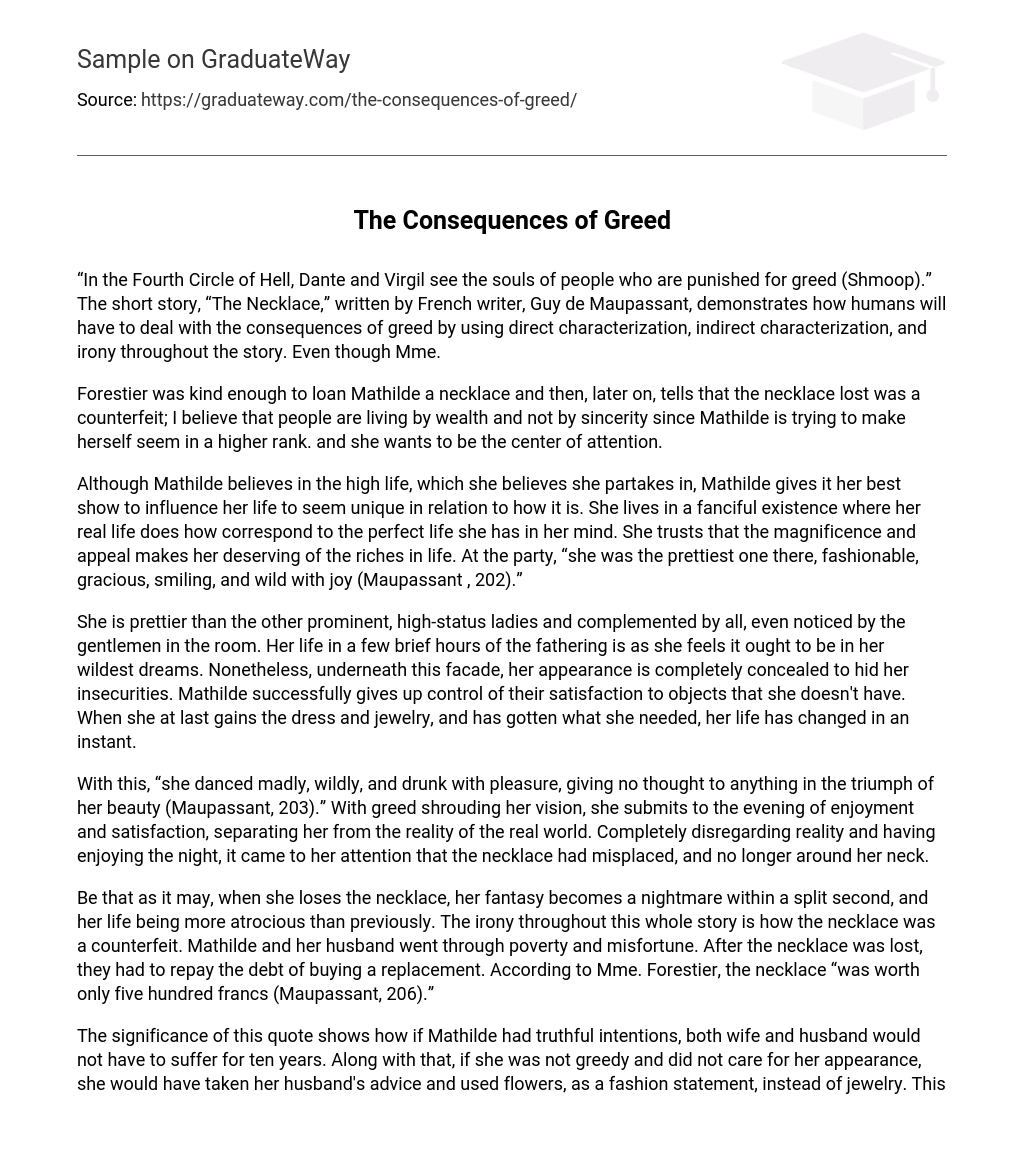“In the Fourth Circle of Hell, Dante and Virgil see the souls of people who are punished for greed (Shmoop).” The short story, “The Necklace,” written by French writer, Guy de Maupassant, demonstrates how humans will have to deal with the consequences of greed by using direct characterization, indirect characterization, and irony throughout the story. Even though Mme.
Forestier was kind enough to loan Mathilde a necklace and then, later on, tells that the necklace lost was a counterfeit; I believe that people are living by wealth and not by sincerity since Mathilde is trying to make herself seem in a higher rank. and she wants to be the center of attention.
Although Mathilde believes in the high life, which she believes she partakes in, Mathilde gives it her best show to influence her life to seem unique in relation to how it is. She lives in a fanciful existence where her real life does how correspond to the perfect life she has in her mind. She trusts that the magnificence and appeal makes her deserving of the riches in life. At the party, “she was the prettiest one there, fashionable, gracious, smiling, and wild with joy (Maupassant , 202).”
She is prettier than the other prominent, high-status ladies and complemented by all, even noticed by the gentlemen in the room. Her life in a few brief hours of the fathering is as she feels it ought to be in her wildest dreams. Nonetheless, underneath this facade, her appearance is completely concealed to hid her insecurities. Mathilde successfully gives up control of their satisfaction to objects that she doesn’t have. When she at last gains the dress and jewelry, and has gotten what she needed, her life has changed in an instant.
With this, “she danced madly, wildly, and drunk with pleasure, giving no thought to anything in the triumph of her beauty (Maupassant, 203).” With greed shrouding her vision, she submits to the evening of enjoyment and satisfaction, separating her from the reality of the real world. Completely disregarding reality and having enjoying the night, it came to her attention that the necklace had misplaced, and no longer around her neck.
Be that as it may, when she loses the necklace, her fantasy becomes a nightmare within a split second, and her life being more atrocious than previously. The irony throughout this whole story is how the necklace was a counterfeit. Mathilde and her husband went through poverty and misfortune. After the necklace was lost, they had to repay the debt of buying a replacement. According to Mme. Forestier, the necklace “was worth only five hundred francs (Maupassant, 206).”
The significance of this quote shows how if Mathilde had truthful intentions, both wife and husband would not have to suffer for ten years. Along with that, if she was not greedy and did not care for her appearance, she would have taken her husband’s advice and used flowers, as a fashion statement, instead of jewelry. This topic is important in lieu of the fact that the lost necklace was worth only five hundred francs, and Mathilde and her husband bargained thirty-six thousand francs, for a replacement.
In Guy de Maupassant’s, “The Necklace,” despite the fact that Mme. Forestier was sufficiently thoughtful to advance Mathilde with jewelry, Mathilde is deprived of judgement; thus leading her to own demise. Similar to the Mathilde, the priests and monks in Dante’s Inferno, possess similar characteristics, in which, “actions that have obviously hurt and damaged family members and friends (Enwright, 17).” Throughout the story, Maupassant indirectly warns readers to be satisfied with what they currently have, and not to care about public images.





